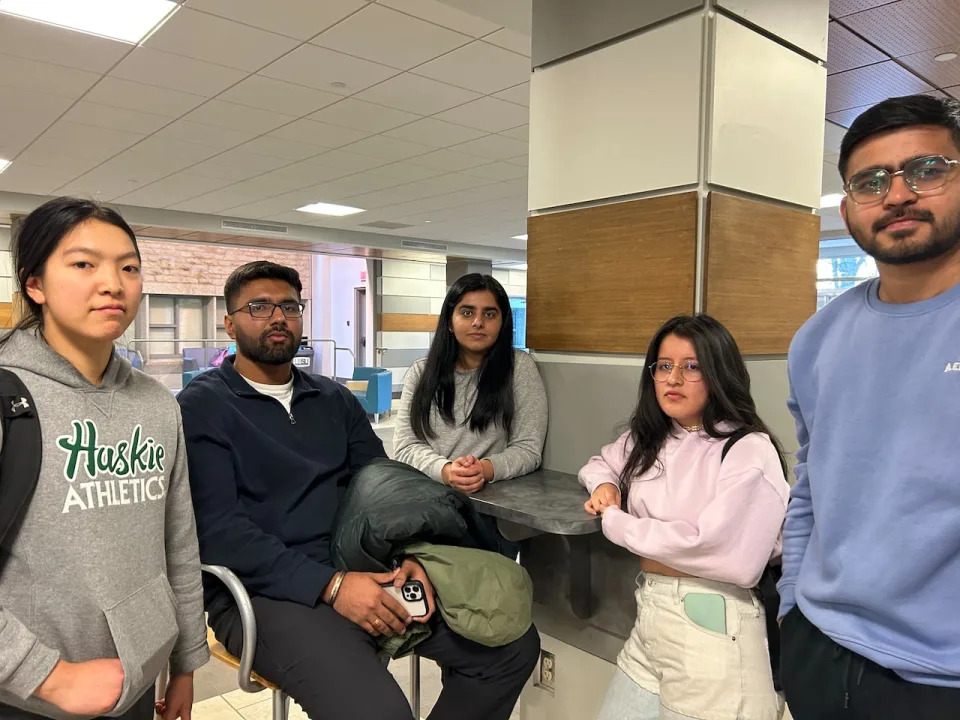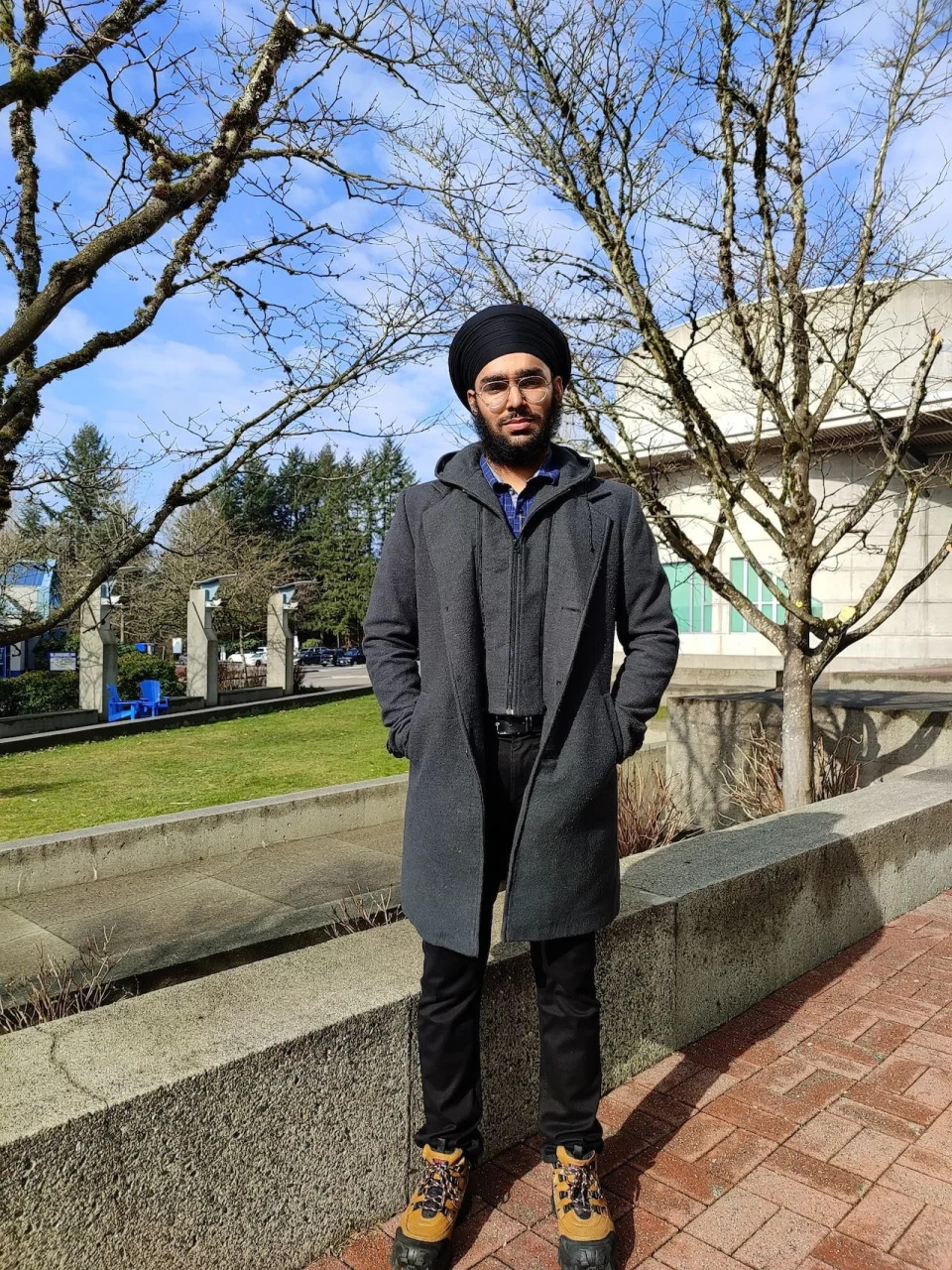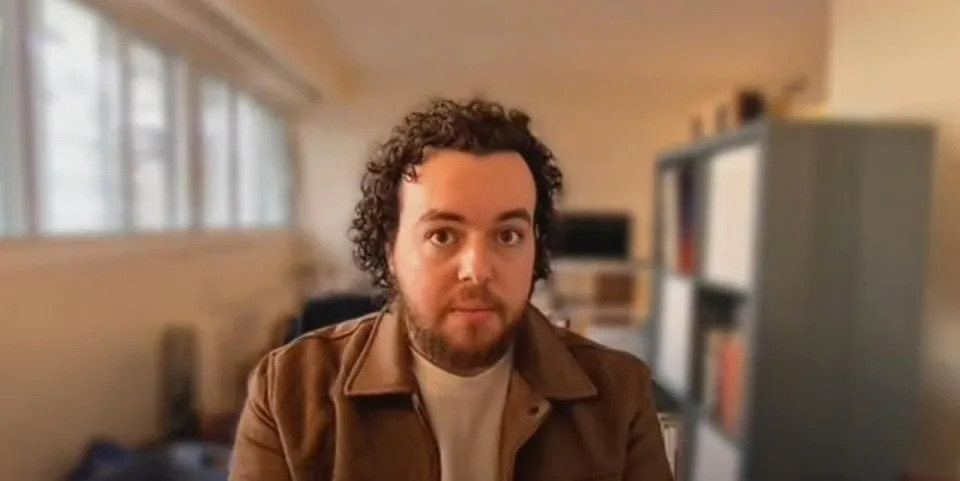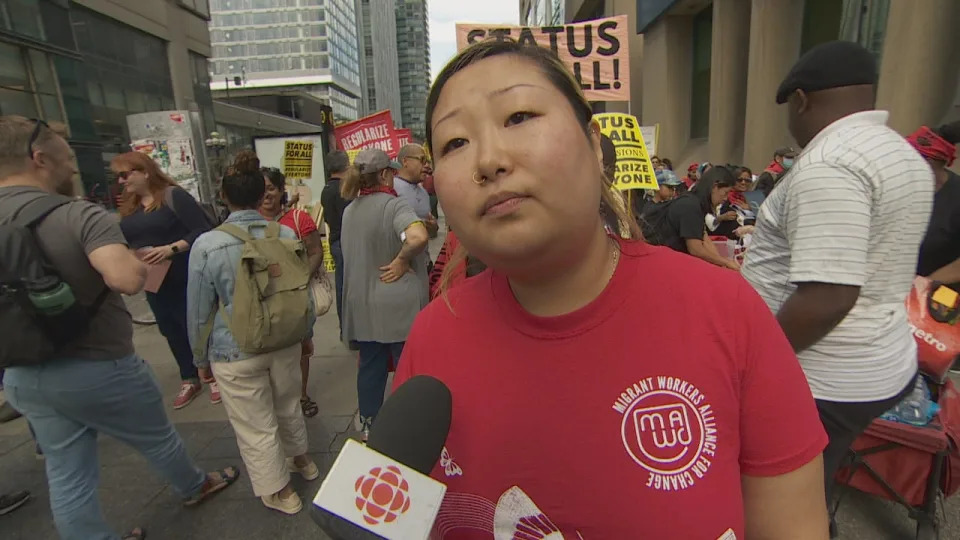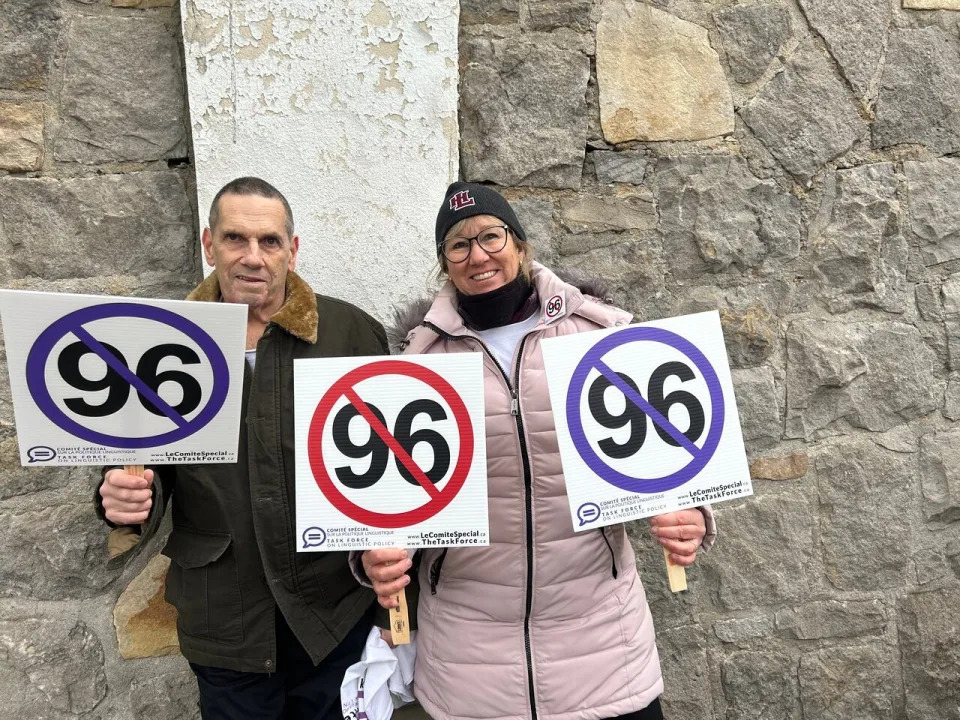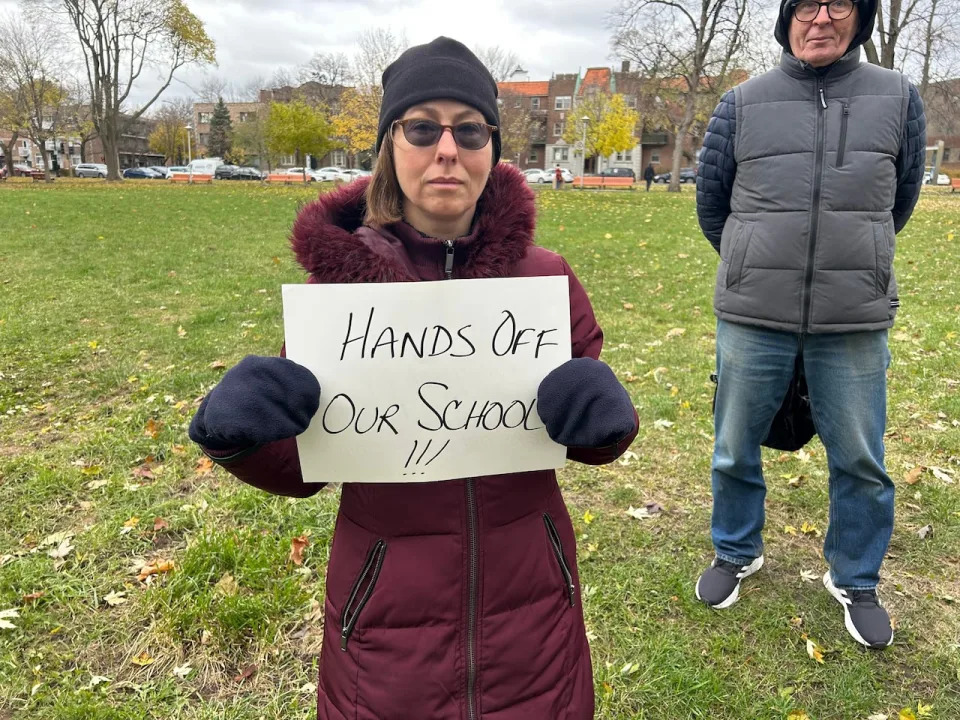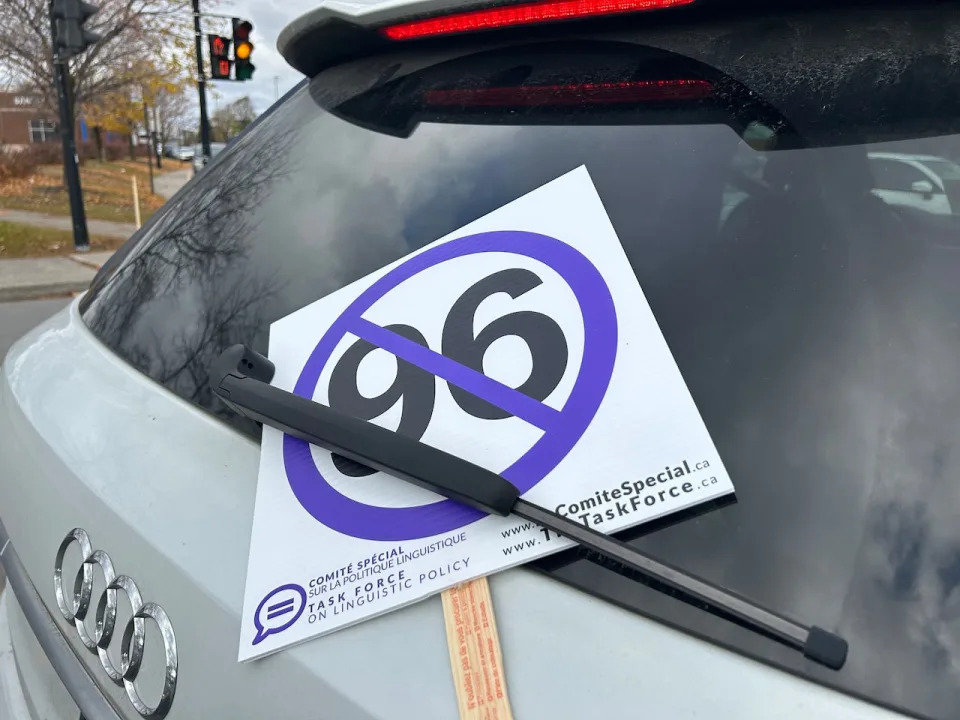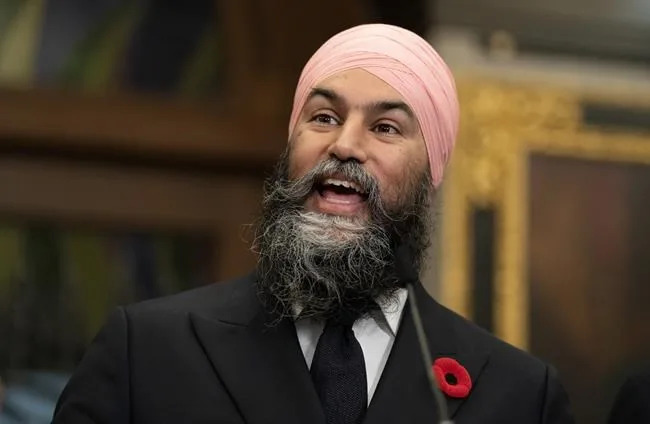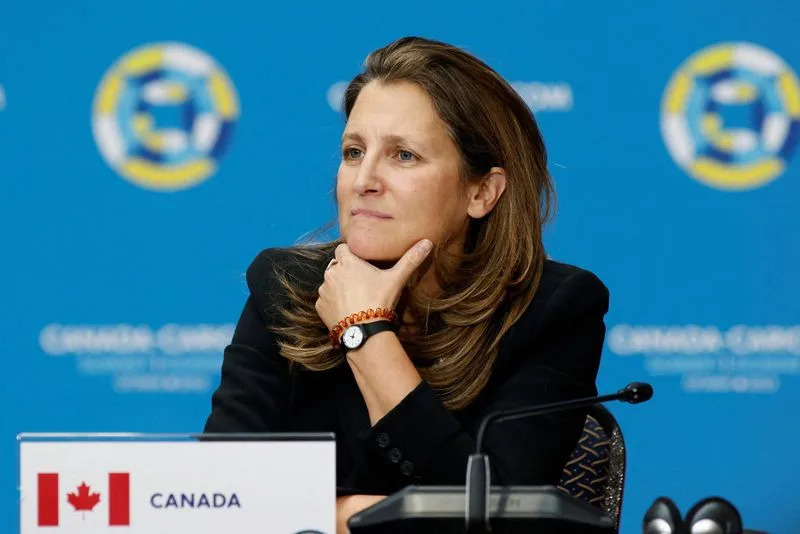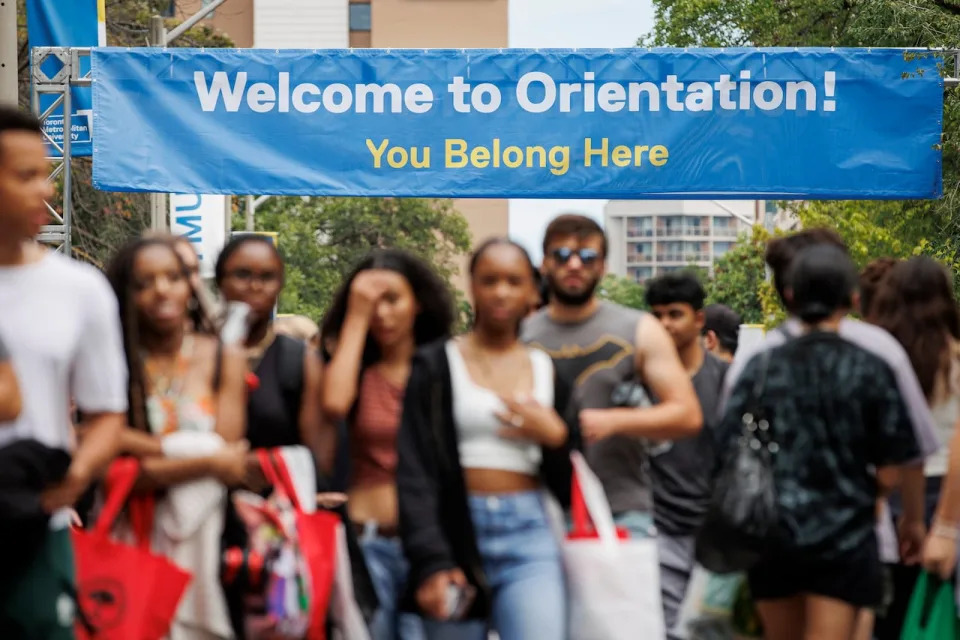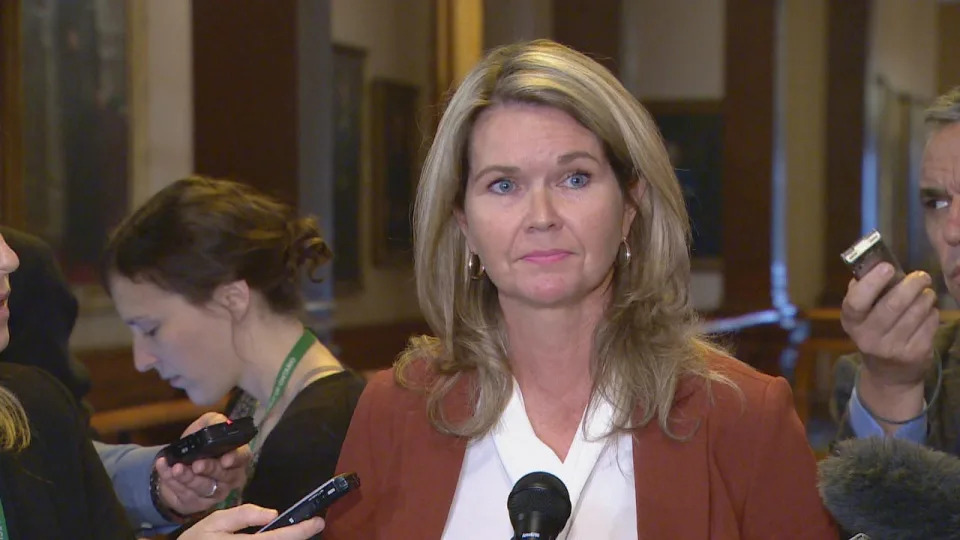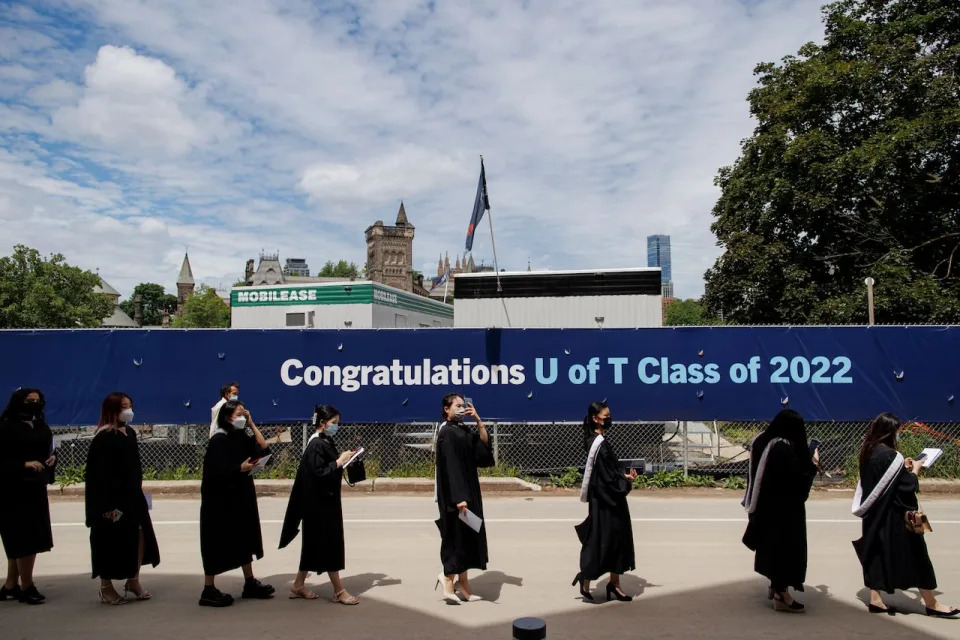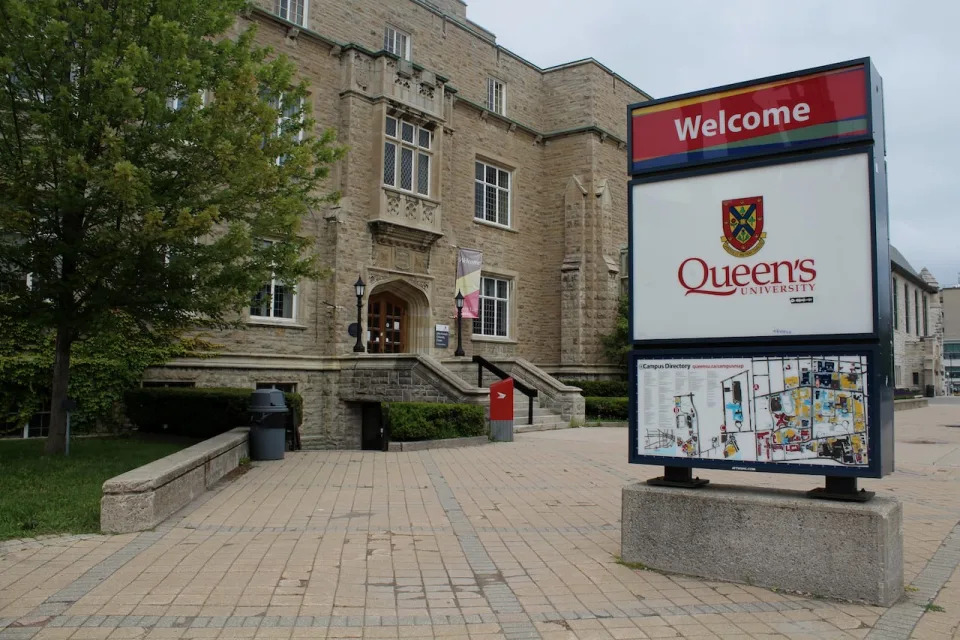CBC
Mon, November 20, 2023
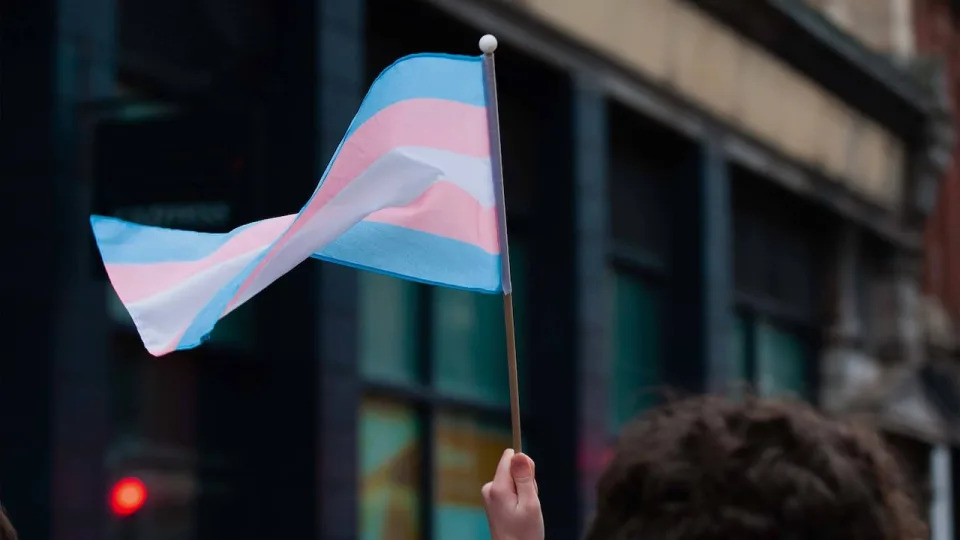
Groups are organizing candlelight vigils across Metro Vancouver to honour the lives of trans people who have died from violence over the past year. (Nicky Ebbage/iStock - image credit)
Many trans and non-binary people, along with allies, are gathering Monday to mark the annual worldwide Transgender Day of Remembrance (TDOR).
Some are choosing to honour lost community members at indoor events, away from the public eye, while others are gathering at outdoor events despite concerns that anti-trans protesters will show up.
Telyn Chan-Kusalik, who's on the organizing committee for a vigil taking place at the Vancouver Art Gallery, says her group is intentionally hosting a public event to raise awareness that trans people are still facing violence and some are being killed.
"Almost exactly a year ago… a member of our community was literally killed by police," she said, referring to Dani Cooper, a 27-year-old poet and anti-poverty activist who was shot twice and killed outside of their North Vancouver, B.C., home in November 2022.
Police had been called to Cooper's home after their mother reported they were having a mental health episode. British Columbia's police watchdog found no wrongdoing by police and said the officer who shot Cooper should not face charges.
However, Cooper's family has maintained the shooting could have been prevented if police were better trained in de-escalation.
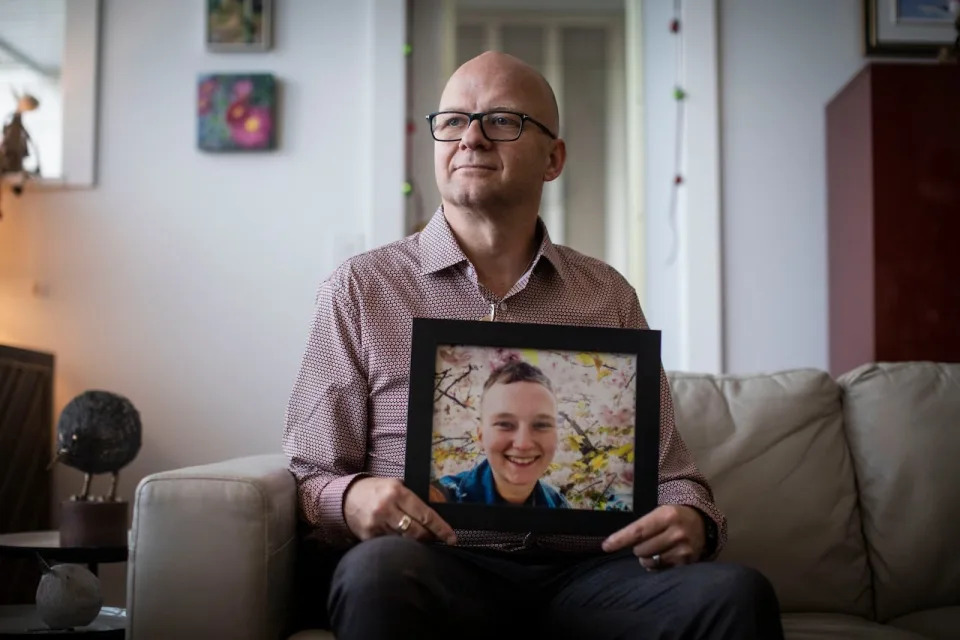
Dennis Cooper is pictured holding a picture of his child who was shot and killed by police in November in North Vancouver, British Columbia on Tuesday December 13, 2022.
Dennis Cooper holds a picture of his child, Dani Cooper, who was shot and killed by police in North Vancouver in 2022. (Ben Nelms/CBC)
Chan-Kusalik says the freshness of Cooper's death is one example of why many will mark the day of remembrance privately, so as not to relive their trauma in public. For example, Qmunity, Vancouver's 2SLGBTQIA+ resource centre, is hosting an indoor event for community members.
"For a lot of folks, it's a very emotional time… especially [for] folks who knew someone personally who was killed or someone who has been a victim of, or survivor of, transphobic violence," Chan-Kusalik said.
A candlelight vigil is planned at the art gallery, and volunteers will share in reading aloud the names of 320 trans people who are recorded to have died from violence worldwide in 2023, according to the Trans Murder Monitoring report. A friend of Cooper's will also speak about their legacy.
According to LGBTQ advocacy group GLAAD, TDOR was started in 1999 in honour of Rita Hester, a trans woman who was killed in her Allston, Mass., apartment in 1998. To this day, her killer has not been found.
'Rising bout of anti-trans sentiment'
In Abbotsford, community members will gather for what they say is the first public outdoor vigil for TDOR in the city's history.
Lydia Luna, one of the organizers, says it will be her first time marking the day. She has only recently embraced her trans identity and it's made her "painfully aware" of the discrimination trans people face.
She said a lot of that has come to light in recent protests against SOGI, an educational resource that teaches children about sexual orientation and gender identity.
"We've been noticing a rising bout of anti-trans sentiment with all of the anti-SOGI groups getting out there and making their feelings known, and we figured it was in our best interest to be visible ourselves," Luna said.
The organizers for both events say they hope there won't be any counter-protesters at what will be a sombre event.
Chan-Kusalik says organizers in Vancouver have been training volunteers in conflict de-escalation in case their event is disrupted.
"We are not gathering to advocate for any specific political change. But we are gathering to remember our deaths and we hope that anyone who shows up in opposition will respect the fact that we have lost community members," she says.
"This is our Remembrance Day. We hope people will respect that," she says.
Select TDOR events happening in B.C.
Abbotsford
Rally for Inclusive Education and TDOR Vigil for Trans Lives, 3 p.m., Jubilee Park
Burnaby
TDOR ceremony, 11 a.m., Simon Fraser University, West Mall Centre Lounge, 8888 University Dr.
UBC
TDOR candlelight vigil and community cooldown by UBC Pride Collective, 5 p.m., outside the Nest
Vancouver
Outdoor candlelight vigil, 7:30 p.m., Vancouver Art Gallery
Indoor art event by Qmunity, 5 p.m., The Birdhouse, 44 West 4th Ave.
Online
TDOR Panel and Vigil by T'evine, 6 p.m. Panel will discuss experiences of living as a trans person.
Transgender Day of Remembrance marked at N.S. legislature with flag-raising
CBC
Mon, November 20, 2023
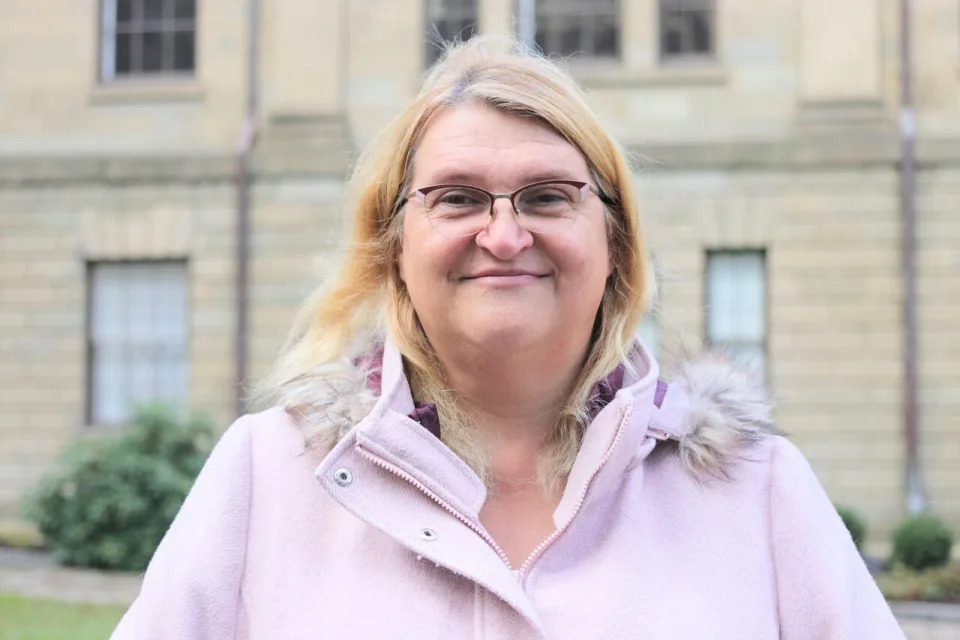
Veronica Merryfield is the founder of the Cape Breton Transgender Network. (Andrew Lam/CBC - image credit)
For Veronica Merryfield, the Transgender Day of Remembrance is a time to pause and remember people she has lost.
"In the near 30 years since I transitioned, I have lost so many friends. And this year's no different," she said during a news conference on Monday.
The day of remembrance is observed internationally to remember people who have died or who have been killed due to anti-trans violence. To mark the occasion, community members and MLAs from different parties gathered for the flag-raising of a trans pride flag at Province House in Halifax.
"It's a day to highlight … the hatred and, you know, the violence that I was hoping we wouldn't see in Canada, that we are starting to see in Canada," said Merryfield, founder of the Cape Breton Transgender Network, in an interview.
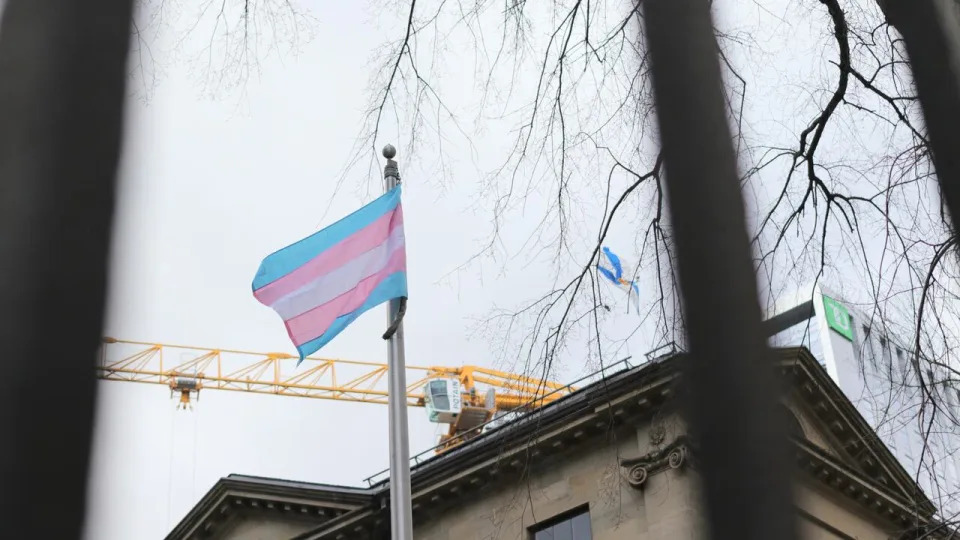
A moment of silence was held before the transgender Pride flag was raised.
CBC
Mon, November 20, 2023

Veronica Merryfield is the founder of the Cape Breton Transgender Network. (Andrew Lam/CBC - image credit)
For Veronica Merryfield, the Transgender Day of Remembrance is a time to pause and remember people she has lost.
"In the near 30 years since I transitioned, I have lost so many friends. And this year's no different," she said during a news conference on Monday.
The day of remembrance is observed internationally to remember people who have died or who have been killed due to anti-trans violence. To mark the occasion, community members and MLAs from different parties gathered for the flag-raising of a trans pride flag at Province House in Halifax.
"It's a day to highlight … the hatred and, you know, the violence that I was hoping we wouldn't see in Canada, that we are starting to see in Canada," said Merryfield, founder of the Cape Breton Transgender Network, in an interview.

A moment of silence was held before the transgender Pride flag was raised.
(Andrew Lam/CBC)
NDP MLA Lisa Lachance hosted the flag-raising. They said although there have been legal changes that promote equality for the trans community, that's not enough.
"I hear from families all the time whose young people face violence and discrimination based on their gender identity, based on being trans," Lachance said. In a news release, the Nova Scotia NDP called for more resources in schools to make them safer for trans and queer youth.
During the news conference, clinical psychologist Erica Baker said discrimination towards trans people can have "significant effects on [their] mental health and wellbeing." She highlighted supports available for people dealing with issues around their gender identity or mental health, including organizations like the Queer and Trans Therapists of Nova Scotia and The Youth Project.
A 2018 Statistics Canada survey found that transgender Canadians are more likely to have experienced violence since the age of 15. It also found that while one in ten cisgender people considered their mental health to be poor or fair, transgender Canadians reported this at a much higher rate.
Merryfield also said more education is needed to address misconceptions about the trans community. "A lot of people don't understand that it's not a choice," she said. "This is something about who we are."
NDP MLA Lisa Lachance hosted the flag-raising. They said although there have been legal changes that promote equality for the trans community, that's not enough.
"I hear from families all the time whose young people face violence and discrimination based on their gender identity, based on being trans," Lachance said. In a news release, the Nova Scotia NDP called for more resources in schools to make them safer for trans and queer youth.
During the news conference, clinical psychologist Erica Baker said discrimination towards trans people can have "significant effects on [their] mental health and wellbeing." She highlighted supports available for people dealing with issues around their gender identity or mental health, including organizations like the Queer and Trans Therapists of Nova Scotia and The Youth Project.
A 2018 Statistics Canada survey found that transgender Canadians are more likely to have experienced violence since the age of 15. It also found that while one in ten cisgender people considered their mental health to be poor or fair, transgender Canadians reported this at a much higher rate.
Merryfield also said more education is needed to address misconceptions about the trans community. "A lot of people don't understand that it's not a choice," she said. "This is something about who we are."
Transgender Day of Remembrance important amid rising incidents of violence: group
The Canadian Press
Mon, November 20, 2023
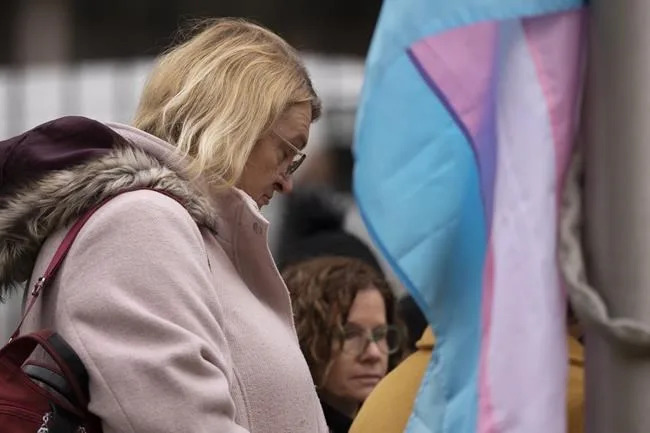
HALIFAX — Marking Transgender Day of Remembrance is especially important this year amid rising incidents of violence and hatred, the founder of a Nova Scotia-based advocacy group said Monday.
Veronica Merryfield, founder of the Cape Breton Transgender Network, made the comments as she participated in a ceremony to raise the trans flag outside the provincial legislature in commemoration of those killed in Canada and around the world in acts of anti-trans violence.
“Today is a very poignant moment to remember those who have lost their lives. In the nearly 30 years since I’ve transitioned, I’ve lost so many friends, and this year is no different,” Merryfield said, holding back tears ahead of the flag raising.
She said she has noticed a significant rise in anti-trans hate in Nova Scotia over the past year, much of it occurring in schools.
In the past two weeks, Merryfield said she's received requests for help from five sets of parents whose children have recently experienced transphobia in Cape Breton schools — more than she has ever received over such a short period.
“And this includes one kid who took a pounding to the head and is still off school with head injuries after two weeks,” she said.
Transphobic rhetoric originating in the United States has spread to Canada, Merryfield said, and is reflected in school policies introduced this year in New Brunswick and Saskatchewan. Both provinces' policies require parental consent before students under 16 can use a preferred first name or pronouns at school.
Merryfield said requiring parental consent for such changes is particularly dangerous for trans students living in "hostile" homes. “And more students live in hostile homes than one might imagine,” she said.
Nova Scotia’s government has said it will not introduce a policy similar to neighbouring New Brunswick, but Merryfield said transgender children in the province still remain at a high risk of experiencing transphobia and violence.
Lisa Lachance, the NDP spokesperson for 2SLGBTQ+ affairs who hosted the flag raising, renewed the party’s calls for action to combat homophobia and transphobia.
“Young people and their families are really facing increasing amounts of discrimination, hatred and violence, and they’re facing that at schools and in communities,” Lachance, who uses the pronouns they and them, told reporters after the flag raising.
As many as 15 per cent of students have experienced homophobia or transphobia at school, according to a May 2023 survey prepared for the Department of Education with responses from more than 66,000 students. The survey also found that 43 per cent of Nova Scotia students witnessed homophobia or transphobia while at school.
Lachance said they’ve received a number of emails from families of students who felt their schools did not have adequate resources to address instances of transphobia in the classroom or on the schoolyard. The NDP is calling on the Department of Education to hire in-school student support workers to help LGBTQ students. It also says students need improved access to LGBTQ literature and support to run Gender and Sexualities Alliances clubs.
The NDP is also asking the Progressive Conservative government to “unequivocally condemn transphobia and hate.” In a statement on social media Monday, Premier Tim Houston marked the day of remembrance by acknowledging lives lost due to violence and transphobia.
“We will continue to work to build up a Nova Scotia that is inclusive and free from hatred and intolerance,” he said.
Prime Minister Justin Trudeau also shared a statement about Transgender Day of Remembrance on social media, calling transphobia unacceptable.
“Today, we remember those whose lives have been taken because of this hate, and we recommit to making sure that everyone can be who they are — openly and proudly, without fear,” Trudeau said.
This report by The Canadian Press was first published Nov. 20, 2023.
Lyndsay Armstrong, The Canadian Press
The Canadian Press
Mon, November 20, 2023

HALIFAX — Marking Transgender Day of Remembrance is especially important this year amid rising incidents of violence and hatred, the founder of a Nova Scotia-based advocacy group said Monday.
Veronica Merryfield, founder of the Cape Breton Transgender Network, made the comments as she participated in a ceremony to raise the trans flag outside the provincial legislature in commemoration of those killed in Canada and around the world in acts of anti-trans violence.
“Today is a very poignant moment to remember those who have lost their lives. In the nearly 30 years since I’ve transitioned, I’ve lost so many friends, and this year is no different,” Merryfield said, holding back tears ahead of the flag raising.
She said she has noticed a significant rise in anti-trans hate in Nova Scotia over the past year, much of it occurring in schools.
In the past two weeks, Merryfield said she's received requests for help from five sets of parents whose children have recently experienced transphobia in Cape Breton schools — more than she has ever received over such a short period.
“And this includes one kid who took a pounding to the head and is still off school with head injuries after two weeks,” she said.
Transphobic rhetoric originating in the United States has spread to Canada, Merryfield said, and is reflected in school policies introduced this year in New Brunswick and Saskatchewan. Both provinces' policies require parental consent before students under 16 can use a preferred first name or pronouns at school.
Merryfield said requiring parental consent for such changes is particularly dangerous for trans students living in "hostile" homes. “And more students live in hostile homes than one might imagine,” she said.
Nova Scotia’s government has said it will not introduce a policy similar to neighbouring New Brunswick, but Merryfield said transgender children in the province still remain at a high risk of experiencing transphobia and violence.
Lisa Lachance, the NDP spokesperson for 2SLGBTQ+ affairs who hosted the flag raising, renewed the party’s calls for action to combat homophobia and transphobia.
“Young people and their families are really facing increasing amounts of discrimination, hatred and violence, and they’re facing that at schools and in communities,” Lachance, who uses the pronouns they and them, told reporters after the flag raising.
As many as 15 per cent of students have experienced homophobia or transphobia at school, according to a May 2023 survey prepared for the Department of Education with responses from more than 66,000 students. The survey also found that 43 per cent of Nova Scotia students witnessed homophobia or transphobia while at school.
Lachance said they’ve received a number of emails from families of students who felt their schools did not have adequate resources to address instances of transphobia in the classroom or on the schoolyard. The NDP is calling on the Department of Education to hire in-school student support workers to help LGBTQ students. It also says students need improved access to LGBTQ literature and support to run Gender and Sexualities Alliances clubs.
The NDP is also asking the Progressive Conservative government to “unequivocally condemn transphobia and hate.” In a statement on social media Monday, Premier Tim Houston marked the day of remembrance by acknowledging lives lost due to violence and transphobia.
“We will continue to work to build up a Nova Scotia that is inclusive and free from hatred and intolerance,” he said.
Prime Minister Justin Trudeau also shared a statement about Transgender Day of Remembrance on social media, calling transphobia unacceptable.
“Today, we remember those whose lives have been taken because of this hate, and we recommit to making sure that everyone can be who they are — openly and proudly, without fear,” Trudeau said.
This report by The Canadian Press was first published Nov. 20, 2023.
Lyndsay Armstrong, The Canadian Press
This Trans Day Of Remembrance, We Should Reckon With The UK's Increasingly Hostile Political Climate
Luan Morris
Mon, November 20, 2023

Luan Morris's artwork
Trigger warning: This article refers to suicide and self-harm as well as transphobia.
Trans Day of Remembrance, November 20, gives the trans community and allies a day to hold space for grief and loss, and a chance to remember all the trans lives lost both this year, and all previous years.
But, it is also a harrowing reminder of the climate trans people continue to face in the UK today.
Alice Litman, 20, took her own life in May 2022 after a long struggle with her mental health. She was on the waiting list for gender-affirming care for more than three years. Alice’s family describe her as a “bold and brave” young woman, who had a natural ability to make other people feel comfortable and welcome.
Just after Trans Day of Remembrance last year, the world lost Finn Hall, 16, to suicide. Finn was an active member of his community and spent his time volunteering. His aunt described him as “a really kind and caring person, he always liked to make people smile”.
Most recently, Corei took his own life on October 12, at 14 years old. Corei, like many trans youth, struggled with his mental health and was subjected to transphobic abuse. Despite this, he left a heartfelt letter forgiving those who had harmed him and calling for the world to protect trans kids in his name.
These are only some of the names we know, mainly the names of trans people with supportive families who have come forward to tell their loved one’s story.
Each one of them should still be here today. Finn should still be volunteering in his community, Corei should be getting excited for Doctor Who’s 60th anniversary special, and Alice should still be dancing.
Suicide rates for trans youth continues to skyrocket each year and this isn’t happening in a vacuum.
The UK media has a huge part to play in contributing and propagating transphobic hate with a growing number of articles about the trans community, despite trans people representingless than 1% of the population. For example, The Daily Telegraph published 75 articles about trans people in January 2023 alone – 73 of which were negative, according to PinkNews.
This harmful journalism was highlighted following the tragic murder of Brianna Ghey in February this year. National newspapers published her deadname (a transgender or non-binary person’s name prior to gender transition) with some also using the incorrect pronouns.
Social media adds another dimension to the difficulties the trans community face, due to transphobic users and trolls. Corei’s grieving mother was subjected to transphobic hate and trolling after sharing the news of Corei’s passing.
Meanwhile, the Home Office acknowledges that politicians’ regular discussion of trans rights may have accelerated the 11% increase in hate crimes recorded over the last year.
At the Conservative Party conference last month, prime minister Rishi Sunak said: “A man is a man, and a woman is a woman, that’s just common sense.”
Sunak’s government has also come under fire for initially not including the trans community in a ban on conversion therapy – before he dropped the ban from the King’s Speech altogether – and for announcing plans to stop trans women accessing female NHS wards. And earlier this year, Sunak even blocked legislation to make it easier for transgender people to self-identify in Scotland – after it had already been passed by the Scottish parliament.
Away from Westminster, the Conservative shadow minister for education in Wales – Laura Ann Jones – has criticised the Welsh government by claiming it is “attempting to push gender ideology in any way they can.”
Perhaps it is no surprise then that Transgender Europe has downgraded the UK from the most progressive country for trans rights in 2013 – out of 49 countries – to 21st place to 2023.
Others think the reality of being trans in the UK is actually worse than stats show.
Galop, an LGBTQ+ charity supporting victims of abuse and violence, released a statement suggesting the 11% rise in transphobic hate crimes recorded by the home office is likely an underestimate. They said: “The government’s own research showing that over 90% of anti-LGBTQ+ hate crimes go unreported.”
That suggests official data used to make and justify legislation is not representing one of the most marginalised communities in 2023 – all while the LGBTQ+ community is still not receiving support and many are left feeling isolated.
Young people are trapped on a five to seven-year waiting list for a first appointment at a gender service which is not operating.
The waitlist has been stagnant since the closure of GIDS (Gender Identity Development Service), with the last patients being offered a first appointment in March 2023. The guidepost of when new interim service hubs with the NHS will open is continuously being delayed. They are due to open in April 2024 at the earliest. In the meantime, a backlog of almost 8,000 young people are left in limbo, and the waiting times grow.
If a young person is referred to GIDS at 14 years old, they must battle with the prospect of not seeing a professional until they’re over 18, at which point they’ve aged out and must join the adult waiting list which is even longer.
As of September 2023, the UK’s oldest and largest gender identity clinic for adults is currently offering first appointments to people who were referred in September 2018.
As the inquest into Alice’s death noted: “If you were referred today, you’d actually be waiting for over 20 years for a first appointment.”
For young people who need puberty blockers, a reversible medication which pauses the effects of the wrong puberty, there is an added distress. Prolonged waiting times mean there is little chance of them being prescribed puberty blockers in time to block puberty – and the UK is in the process of making access even harder by requiring young people to join a research protocol in order to access these blockers into adulthood.
This is a scary, frustrating, anxiety inducing and hopeless position to put vulnerable young people in. The mental impact festers and builds in intensity year on year.
Trans young people do not even get respite at school, many young people face transphobia, bullying, harassment, and discrimination in and outside of the classroom – 51% are bullied at school for being trans.
The government is meant to publish guidance for schools around supporting trans and gender diverse young people – yet there are fears it may be less about support and more about limiting trans young people’s rights to privacy,autonomy, and self-expression.
Mental health issues disproportionately affect trans young people, meaning they are at an increased risk of self-harm, that is before you consider the wider context and the additional stress that places on their lives.
Even in crisis, young people are let down by health services with CAMHS (Child and Adolescent Mental Health Services) at breaking point. According to trans youth charity Mermaids, young people face a postcode lottery when it comes to being referred to CAMHS via their GP, with desperate young people waiting up to four years for critical help.
The failure of care towards trans young people leads to a devastatingly higher rate of suicide compared to their cisgender peers.
And despite the pain and loss the trans community faces year on year, the government turns a blind eye.
The government does not hold data on trans deaths by murder or suicide. In failing to accurately record trans’ deaths and track the data that would expose the depth of this issue – the government does not appear to be take responsibility or accountability for not applying measures that would tangibly improve trans young people’s lives.
The landscape is hostile but standing up for trans people’s rights is more important now than ever. So, this Trans Day of Remembrance Day, it’s important to hold space to those whom we have already lost, and use our voices, communities and resources to campaign for the lives we deserve, as we don’t want to lose anymore.
Help and support:
The Gender Trust supports anyone affected by gender identity | 01527 894 838
Mermaids offers information, support, friendship and shared experiences for young people with gender identity issues | 0208 1234819
LGBT Youth Scotland is the largest youth and community-based organisation for LGBT people in Scotland. Text 07786 202 370
Gires provides information for trans people, their families and professionals who care for them | 01372 801554
Depend provides support, advice and information for anyone who knows, or is related to, a transsexual person in the UK
Mind, open Monday to Friday, 9am-6pm on 0300 123 3393.
Samaritans offers a listening service which is open 24 hours a day, on 116 123 (UK and ROI - this number is FREE to call and will not appear on your phone bill).
CALM (the Campaign Against Living Miserably) offer a helpline open 5pm-midnight, 365 days a year, on 0800 58 58 58, and a webchat service.
The Mix is a free support service for people under 25. Call 0808 808 4994 or email help@themix.org.uk
Rethink Mental Illness offers practical help through its advice line which can be reached on 0808 801 0525 (Monday to Friday 10am-4pm). More info can be found on rethink.org.
Related...
Being Trans In The UK Just Gets Worse And Worse – Here's The Proof
I Hid My True Identity For Decades. Here's What Happened When I Finally Revealed Myself At 63.
Trans+ People Are Under Attack. Here's What You Can Do To Help
Being Trans In The UK Just Gets Worse And Worse – Here's The Proof
Luan Morris
Mon, November 20, 2023

Luan Morris's artwork
Trigger warning: This article refers to suicide and self-harm as well as transphobia.
Trans Day of Remembrance, November 20, gives the trans community and allies a day to hold space for grief and loss, and a chance to remember all the trans lives lost both this year, and all previous years.
But, it is also a harrowing reminder of the climate trans people continue to face in the UK today.
Alice Litman, 20, took her own life in May 2022 after a long struggle with her mental health. She was on the waiting list for gender-affirming care for more than three years. Alice’s family describe her as a “bold and brave” young woman, who had a natural ability to make other people feel comfortable and welcome.
Just after Trans Day of Remembrance last year, the world lost Finn Hall, 16, to suicide. Finn was an active member of his community and spent his time volunteering. His aunt described him as “a really kind and caring person, he always liked to make people smile”.
Most recently, Corei took his own life on October 12, at 14 years old. Corei, like many trans youth, struggled with his mental health and was subjected to transphobic abuse. Despite this, he left a heartfelt letter forgiving those who had harmed him and calling for the world to protect trans kids in his name.
These are only some of the names we know, mainly the names of trans people with supportive families who have come forward to tell their loved one’s story.
Each one of them should still be here today. Finn should still be volunteering in his community, Corei should be getting excited for Doctor Who’s 60th anniversary special, and Alice should still be dancing.
Suicide rates for trans youth continues to skyrocket each year and this isn’t happening in a vacuum.
The UK media has a huge part to play in contributing and propagating transphobic hate with a growing number of articles about the trans community, despite trans people representingless than 1% of the population. For example, The Daily Telegraph published 75 articles about trans people in January 2023 alone – 73 of which were negative, according to PinkNews.
This harmful journalism was highlighted following the tragic murder of Brianna Ghey in February this year. National newspapers published her deadname (a transgender or non-binary person’s name prior to gender transition) with some also using the incorrect pronouns.
Social media adds another dimension to the difficulties the trans community face, due to transphobic users and trolls. Corei’s grieving mother was subjected to transphobic hate and trolling after sharing the news of Corei’s passing.
Meanwhile, the Home Office acknowledges that politicians’ regular discussion of trans rights may have accelerated the 11% increase in hate crimes recorded over the last year.
At the Conservative Party conference last month, prime minister Rishi Sunak said: “A man is a man, and a woman is a woman, that’s just common sense.”
Sunak’s government has also come under fire for initially not including the trans community in a ban on conversion therapy – before he dropped the ban from the King’s Speech altogether – and for announcing plans to stop trans women accessing female NHS wards. And earlier this year, Sunak even blocked legislation to make it easier for transgender people to self-identify in Scotland – after it had already been passed by the Scottish parliament.
Away from Westminster, the Conservative shadow minister for education in Wales – Laura Ann Jones – has criticised the Welsh government by claiming it is “attempting to push gender ideology in any way they can.”
Perhaps it is no surprise then that Transgender Europe has downgraded the UK from the most progressive country for trans rights in 2013 – out of 49 countries – to 21st place to 2023.
Others think the reality of being trans in the UK is actually worse than stats show.
Galop, an LGBTQ+ charity supporting victims of abuse and violence, released a statement suggesting the 11% rise in transphobic hate crimes recorded by the home office is likely an underestimate. They said: “The government’s own research showing that over 90% of anti-LGBTQ+ hate crimes go unreported.”
That suggests official data used to make and justify legislation is not representing one of the most marginalised communities in 2023 – all while the LGBTQ+ community is still not receiving support and many are left feeling isolated.
Young people are trapped on a five to seven-year waiting list for a first appointment at a gender service which is not operating.
The waitlist has been stagnant since the closure of GIDS (Gender Identity Development Service), with the last patients being offered a first appointment in March 2023. The guidepost of when new interim service hubs with the NHS will open is continuously being delayed. They are due to open in April 2024 at the earliest. In the meantime, a backlog of almost 8,000 young people are left in limbo, and the waiting times grow.
If a young person is referred to GIDS at 14 years old, they must battle with the prospect of not seeing a professional until they’re over 18, at which point they’ve aged out and must join the adult waiting list which is even longer.
As of September 2023, the UK’s oldest and largest gender identity clinic for adults is currently offering first appointments to people who were referred in September 2018.
As the inquest into Alice’s death noted: “If you were referred today, you’d actually be waiting for over 20 years for a first appointment.”
For young people who need puberty blockers, a reversible medication which pauses the effects of the wrong puberty, there is an added distress. Prolonged waiting times mean there is little chance of them being prescribed puberty blockers in time to block puberty – and the UK is in the process of making access even harder by requiring young people to join a research protocol in order to access these blockers into adulthood.
This is a scary, frustrating, anxiety inducing and hopeless position to put vulnerable young people in. The mental impact festers and builds in intensity year on year.
Trans young people do not even get respite at school, many young people face transphobia, bullying, harassment, and discrimination in and outside of the classroom – 51% are bullied at school for being trans.
The government is meant to publish guidance for schools around supporting trans and gender diverse young people – yet there are fears it may be less about support and more about limiting trans young people’s rights to privacy,autonomy, and self-expression.
Mental health issues disproportionately affect trans young people, meaning they are at an increased risk of self-harm, that is before you consider the wider context and the additional stress that places on their lives.
Even in crisis, young people are let down by health services with CAMHS (Child and Adolescent Mental Health Services) at breaking point. According to trans youth charity Mermaids, young people face a postcode lottery when it comes to being referred to CAMHS via their GP, with desperate young people waiting up to four years for critical help.
The failure of care towards trans young people leads to a devastatingly higher rate of suicide compared to their cisgender peers.
And despite the pain and loss the trans community faces year on year, the government turns a blind eye.
The government does not hold data on trans deaths by murder or suicide. In failing to accurately record trans’ deaths and track the data that would expose the depth of this issue – the government does not appear to be take responsibility or accountability for not applying measures that would tangibly improve trans young people’s lives.
The landscape is hostile but standing up for trans people’s rights is more important now than ever. So, this Trans Day of Remembrance Day, it’s important to hold space to those whom we have already lost, and use our voices, communities and resources to campaign for the lives we deserve, as we don’t want to lose anymore.
Help and support:
The Gender Trust supports anyone affected by gender identity | 01527 894 838
Mermaids offers information, support, friendship and shared experiences for young people with gender identity issues | 0208 1234819
LGBT Youth Scotland is the largest youth and community-based organisation for LGBT people in Scotland. Text 07786 202 370
Gires provides information for trans people, their families and professionals who care for them | 01372 801554
Depend provides support, advice and information for anyone who knows, or is related to, a transsexual person in the UK
Mind, open Monday to Friday, 9am-6pm on 0300 123 3393.
Samaritans offers a listening service which is open 24 hours a day, on 116 123 (UK and ROI - this number is FREE to call and will not appear on your phone bill).
CALM (the Campaign Against Living Miserably) offer a helpline open 5pm-midnight, 365 days a year, on 0800 58 58 58, and a webchat service.
The Mix is a free support service for people under 25. Call 0808 808 4994 or email help@themix.org.uk
Rethink Mental Illness offers practical help through its advice line which can be reached on 0808 801 0525 (Monday to Friday 10am-4pm). More info can be found on rethink.org.
Related...
Being Trans In The UK Just Gets Worse And Worse – Here's The Proof
I Hid My True Identity For Decades. Here's What Happened When I Finally Revealed Myself At 63.
Trans+ People Are Under Attack. Here's What You Can Do To Help
Being Trans In The UK Just Gets Worse And Worse – Here's The Proof


